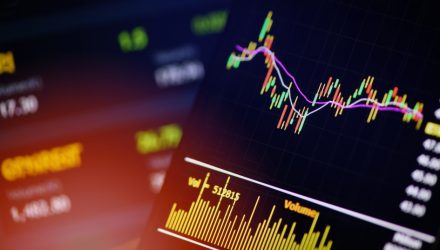With volatility surging in these times of uncertainty with the coronavirus pandemic still a wild card in the capital markets and its impending effects on the global economy, investors could be seeing more rough waters ahead. To navigate the rough tide, getting factor-based exposure though smart beta exchange-traded funds (ETFs) is certainly an option.
“An alternative strategy is investing in factor-based ETFs, also known as Smart Beta ETFs, to gain a tilted exposure to the global equity market,” William Gormly of Bell Potter Securities wrote in LiveWire. “Whilst traditional ETFs track a market-cap weighted index, a factor-based ETF applies a rules-based investing approach.”
A Bell Potter report provided 10 different funds that tilted towards the defensive in global equities. One of the ETFs was the VanEck Vectors Morningstar Wide Moat ETF (NYSEArca: MOAT).
The Morningstar Economic Moat Rating methodology assigns an economic moat rating to companies, but in addition, it focuses on companies exhibiting attractive valuations relative to its price. Furthermore, the indexing methodology uses five sources of economic moats:
- Intangible assets with brand recognition for premium pricing options
- Switching costs that make it too expensive to stop using a company’s products
- Network effect that occurs when the value of a company’s service increases as more use the service
- A cost advantage helps companies undercut competitors on pricing while earning similar margins
- Efficient scale associated with a competitive advantage in a niche market
“The factor-based ETFs explored in this report are aimed at providing a defensive tilt to long global equities,” Gormly added. “These factors include companies that are included in a portfolio due to high quality scores based on key fundamental factors, minimum volatility strategies that aim to decrease less than the broad market during downturns and strategies that incorporate multiple-factors to reduce intra-portfolio correlation.”
To view the rest of the funds, click here.
Using a Comprehensive Factor Approach
Investors who are getting their toes wet with factor investing have a litany of options when it comes to choosing which fund suits their portfolios best. One way to approach the current market environment is to take a one-size-fits-all approach with funds like the Xtrackers FTSE Developed ex US Comprehensive Factor ETF (NYSEArca: DEEF).
DEEF seeks investment results that correspond generally to the performance of the FTSE Developed ex US Comprehensive Factor Index. The index is designed to track the equity market performance of companies in developed countries selected on the investment style criteria of value, momentum, quality, low volatility, and size.
As investors look into these factor-based funds or any funds for that matter, cost will always be a big determinant when it comes to how they allocate their capital. In this case, DEEF’s 0.24% expense ratio is lower than its category average of 0.37% based on Yahoo Finance profile data.
For more market trends, visit ETF Trends.
